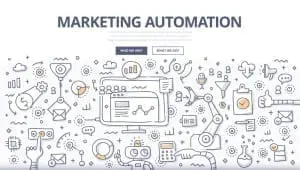 Marketing automation is not new, but it has undergone drastic changes since the early 2000s. Especially with the rise of personalization, and customers’ expectations in a tech-driven marketplace, it’s increasingly important for businesses to automate their internet marketing to compete.
Marketing automation is not new, but it has undergone drastic changes since the early 2000s. Especially with the rise of personalization, and customers’ expectations in a tech-driven marketplace, it’s increasingly important for businesses to automate their internet marketing to compete.
What Is Marketing Automation?
Despite the sound of it, marketing automation is not a fully hands-off marketing process. Instead, it’s the term used to describe marketing software that increases efficiency by streamlining marketing tasks. It does not describe the process so much as the specific software that’s used. This software category is used to automate, measure, and otherwise simplify marketing.
Marketing automation is useful for helping a company save money, increase productivity, increase sales, and their ROI, while also giving customers a better experience. These benefits are not limited to the marketing department, because they spread throughout the entire organization in the form of increased revenues and greater efficiency.
Which Marketing Functions Can Be Automated?
Internet marketing is a complex business activity that cannot be fully automated. However, much of the legwork be efficiently managed by software. Most of the functionality is seen in online marketing and analytics, rather than traditional marketing activities. Common automated marketing functions include:
- Email marketing.
- Lead management.
- Lead generation.
- Marketing program management.
- Social media marketing.
- Marketing resource management and tracking.
- Campaign and general analytics.
These activities can be managed with marketing automation software to differing degrees, depending on the software solution. For example, one software solution may provide the ability to segment or grade leads, while another may not offer the same features.
Examples of Marketing Automation
Some standalone software solutions focus on a single marketing function, while others provide a suite of tools already setup to work in concert with one another.
Examples of standalone software solutions for marketing automation include:
- CRM (Customer Relationship Management) is software used to foster and manage relationships with potential, current, and past customers, in addition to the companies and people that interact with the business and its staff. Many of the best CRMs are customized and heavily automated to manage customers through the sales cycle, such as Broad-based CRMs include Insightly, Zoho CRM, Infusionsoft, and Salesforce.
- Email Marketing software is used to send large numbers of emails. Automation capabilities vary depending on the service, with some software solutions including complex automation to walk users through the sales cycle, including ecommerce. Popular providers of email marketing software include ActiveCampaign, MailChimp, and Constant Contact.
- Social Media management software automates redundant and time-consuming tasks based on specific criteria, such as posting to social profiles, curating content, liking reviews, comments, posts and mentions, and hiding and deleting comments. A great solution for automating social media is our very own SMclicks.com. Other solutions include Hootsuite, SproutSocial, Buffer, Social Oomph, and Social Flow.
Examples of companies offering a suite of software solutions that are integrated into a single application include SharpSpring, Infusionsoft, HubSpot, Salesforce, Marketo, and Act-on.
How to Start Using Marketing Automation
This article is a brief overview of marketing automation. If you are interested in doing further research, guides such as Marketo’s Definitive Guide to Marketing Automation are very useful.
For a free consultation to discover how to lower your marketing costs, increase productivity, and add profits to your bottom line, please contact us at your earliest convenience.
